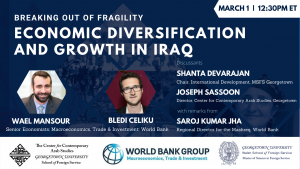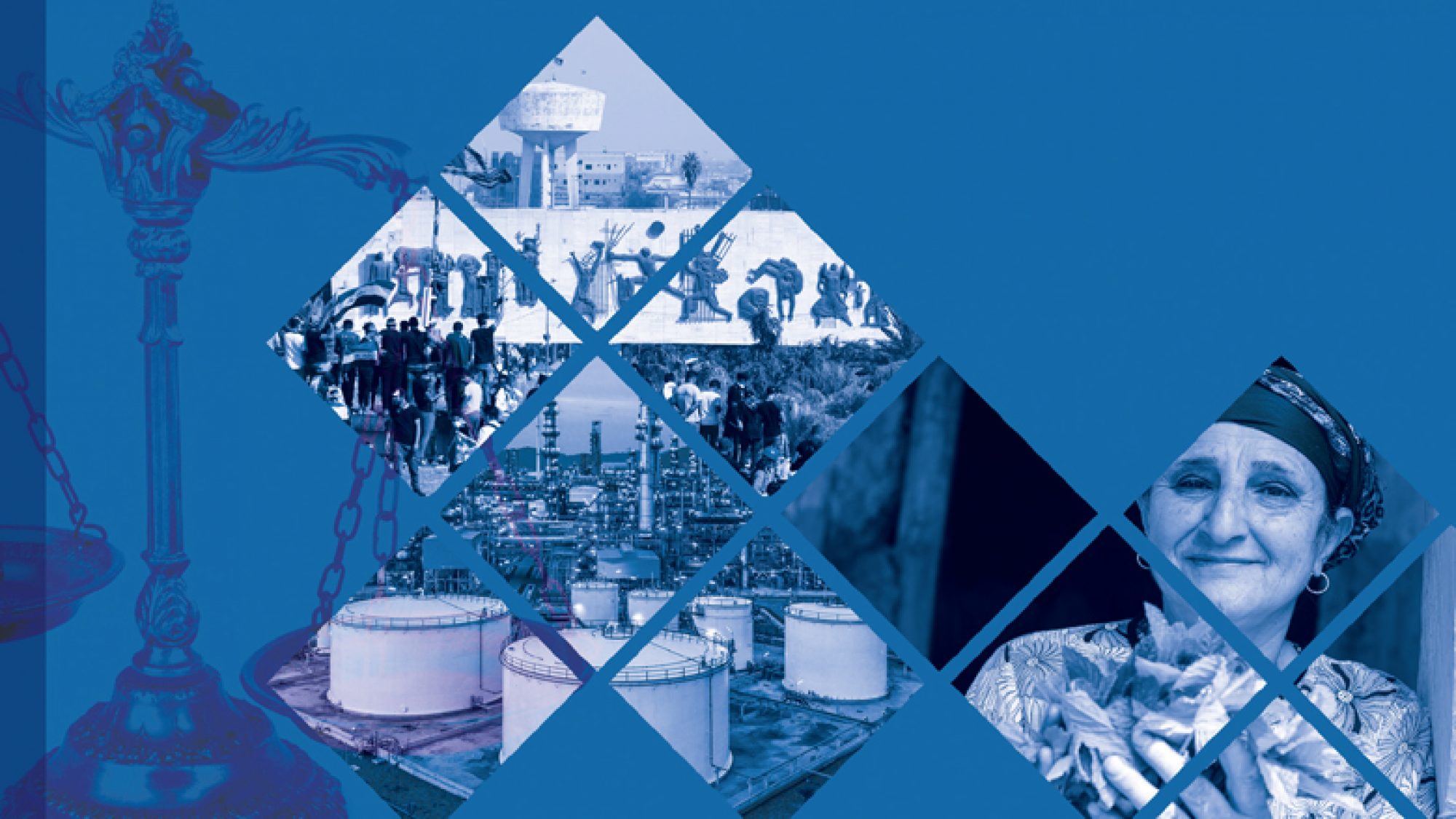Breaking out of Fragility: Economic Diversification and Growth in Iraq

The Center for Contemporary Arab Studies and the M.S. in Foreign Service Program at Georgetown University along with the World Bank invite you to this webinar on the recent World Bank report “Breaking out of Fragility: Economic Diversification and Growth in Iraq.”
Why has Iraq not managed to escape the fragility trap? Despite the challenges of instability due to the COVID pandemic, a drop in oil prices, and recent protests, Iraq can take the path toward sustainable growth, peace, and stability and improve living standards for its people. Learn about what the country can do to turn crises into opportunity, diversify its economy away from the oil sector, and sustain future growth.
This event will be moderated by Prof. Shanta Devarajan (Concentration Chair, International Development, MSFS) and Prof. Joseph Sassoon (Director, Center for Contemporary Arab Studies), senior advisors for the report. Dr. Wael Mansour and Dr. Bledi Celiku, Senior Economists in the Macroeconomics, Trade, and Investment Global Practice program at the World Bank will share insights from the report. Saroj Kumar Jha, Regional Director of the Mashreq Department at the World Bank, will give opening remarks.
Dr. Wael Mansour, Senior Economist @World Bank Group, Macroeconomics, Trade, and Investment
Wael Mansour is a World Bank senior economist at the macroeconomics, trade, and investment global practice. He is currently the country economist for the World Bank’s Iraq program. Wael works on areas linked to macroeconomic & fiscal policy, public expenditure management & fiscal risks, as well as growth and diversification strategies for commodity dependent countries. His work spans across many regions including the Middle East, West Africa and East Asia & Pacific. He holds a PhD in Economics from Sussex University.
Dr. Bledi Celiku, Senior Economist @World Bank Group Macroeconomics, Trade & Investment
Bledi Celiku is a Senior Economist at the Macroeconomics, Trade & Investment global practice. He is currently the country economist for the World Bank’s Bolivia and Chile program. Previously he worked for the World Bank as a country economist for the Iraq program and on strategic and analytical issues for fragile and conflict-affected countries. Prior to joining the World Bank he taught economics at Christopher Newport University. He works on areas linked to economic growth & diversification, macroeconomic & fiscal policy, and public expenditure management. He holds a PhD in Economics from Georgetown University.
Prof. Shanta Devarajan, M.S. in Foreign Service Chair, International Development; Professor in the Practice of International Affairs
Professor Devarajan is Professor in the Practice of International Affairs and Concentration Chair in International Development. Prior to joining MSFS, he served as the World Bank’s Senior Director for Development Economics. Prof. Devarajan teaches courses on development policy, the economics of development, and climate change and development.
Prof. Joseph Sassoon, Director, Center for Contemporary Arab Studies; Al-Sabah Chair in Politics and Political Economy of the Arab World
In addition to his faculty role at Georgetown, Sassoon is a Senior Associate Member at St Antony’s College, Oxford. Sassoon completed his Ph.D. at St Antony’s College, Oxford. and has published extensively on Iraq and its economy and on the Middle East. Prior to Georgetown, he founded and served as Managing Partner of a wealth management and advisory group, ACP Partners LLP, advising families in Europe and the Middle East on their investments. Previously, he served as General Partner of Goldman Sachs and Head of the Wealth Management business in Europe and the Middle East.
Please email mcf77@georgetown.edu with questions and requests for accomodation.
